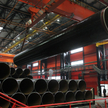Now in its ninth year, the report is firmly established as one of the key sources of insightful and comprehensive business analysis across the eighteen countries that compose the Central European region.
This time last year, I wrote about the stagnation that appeared to have the region in its grips. This year, we see a more optimistic picture, with over 52% of companies in the ranking recording a rise in revenue (up from 49.8% the previous year).
A number of industries performed particularly well; the strong performance of consumer goods and transport organisations in the region saw their representation in the ranking rise to 176 of the 500 companies, while the booming automotive industry drove higher revenues across the entire industrial goods sector.
The revenue story is not altogether a cause for celebration, however. Falling fuel prices saw nearly 60% of the featured energy companies experience a fall in revenues. This was at least partially responsible for a 1.8% year-on-year decline in the total combined revenues of all 500 companies in the ranking, to EUR 682 bn.
Nonetheless, there is a strong sense - especially when we look at the GDP figures - that the region's four Visegrad economies, Poland, the Czech Republic, Slovakia and Hungary, are in a much more stable and sustainable position than 12 months ago. Most of the region's other economies are only lagging these leaders by some 12 to 18 months.























